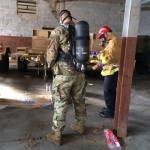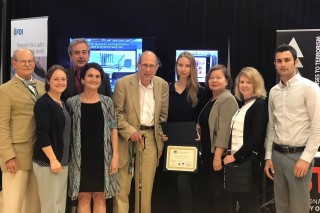News & Events
ALERT Program
2018 DHS COE Summit Facilitates Collaboration and Advances DHS Mission July 31, 2018

ALERT, along with other current and emeritus DHS Centers of Excellence (COEs), hosted the 2018 Centers of Excellence Summit in Arlington, Virginia on May 30-31, 2018. The event focused on the topic of “University Research and Development to Protect the Homeland.” The DHS COE Summit provided the Centers of Excellence an opportunity to showcase their innovative solutions to homeland security challenges and facilitate collaboration across homeland security enterprise leadership and component end-users and industry participants. According to ALERT Center Director, Michael B. Silevitch,
“One of the most valuable aspects of the Summit was the teamwork needed to pull it together. It required a concerted effort by all of the COEs to organize and orchestrate the event. Going forward, this teamwork will lead to meaningful cross-center collaboration.”
The agenda for the two-day long summit was launched with a keynote address from Christopher C. Krebs, Senior Official Performing the Duties of Under Secretary, National Protection and Programs Directorate (NPPD) and included talks by various security administrators, panel discussions, student posters, and a technology showcase.
Director Silevitch moderated a panel focused on “Transportation and Critical Infrastructure” on the first day of the summit. Panelists Carl Crawford, Eva Lee, David Nicol, and Detlof VonWinterfeldt addressed four questions related to this topic:
- What are some of the grand challenges that need to be addressed to enable the next generation of Homeland Security transportation and critical infrastructure solutions?
- What research needs to be done in order to address these challenges?
- How can the research outcomes be effectively transitioned to the field?
- What metrics can be used to enable a cost-benefit analysis of the research/transition impact?
ALERT’s Transition Team made connections with end users at the technology showcase and featured some of ALERT’s latest solutions in multi-view air cargo CT scanners, effective personnel screening, video tracking at the airport security checkpoint, and K9 explosives training aids.
COEs excel in advancing the state of the art thanks in large part to their student researchers. To acknowledge this, the summit provided students with the opportunity to present their work to attendees. Katherine Graham, one of ALERT’s talented undergraduate researchers, took home the Best Poster Award for her work on “Compressive Reflector Antennas for High-Sensing Capacity Imaging Applications.” These antenna designs provide a less complex and lower cost solution for high-sensing capacity millimeter wave imaging systems. Millimeter wave imaging systems have the potential for use in several near-field imaging applications such as security screening, non-destructive testing, autonomous driving, and biotechnology. The abstracts for the COE Summit student posters are available for download on the COE Summit 2018 website.
The summit provided an all-hands-on-deck approach to addressing homeland security challenges by bringing together some of the nation’s best academic, public, and private sector leaders to discuss strategies for advancing the mission of the Department of Homeland Security. ALERT looks forward to the next DHS COE Summit, and hopes you will join us there!
ALERT Launches New Workshop Series July 31, 2018

July 31, 2018
The first Advanced Development for Security Applications for Customs and Border Protection (ADSA-CBP-01) Workshop occurred on June 20-21, 2018 at Northeastern University in Boston, MA. This workshop, an offshoot of the original ALERT ADSA Workshop series, brought together 120 attendees from government, industry, and academia to discuss key problem areas in port security, as well as current technology and potential improvements; brainstorm the future state of cargo security; and identify future technology concepts.
The ADSA-CBP-01 Workshop addressed problem solving for the following venues, threats, and stakeholders:
- Ports of entry: mail, parcel, airports, ships, rails, and land crossing
- Transportation: aircraft, rail, cars, trucks, ships, and pedestrians
- Threats: persons and/or contraband (narcotics, agriculture products and intellectual property)
- Stakeholders: DHS-CBP, industry, academia, and national labs
Presentations were given in the following areas of expertise:
- Scanning technologies
- Concepts of operation
- Deterrence and hardening
- Financial and policy implications
If you were unable to attend the ADSA-CBP-01 Workshop, presentations from the two-day event are available for download.
The ADSA-CBP-01 Workshop is convened by the Department of Homeland Security (DHS) Center of Excellence (COE) for Awareness and Localization of Explosives-Related Threats (ALERT) at Northeastern University. ALERT is supported by the DHS Science and Technology Directorate and the Customs and Borders Protection Office of Field Operations through the DHS Office of University Programs.
The next installment of this workshop series, ADSA-CBP-02, is planned for March 2019. These workshops are by invitation only; however, if you are interested in attending, please inquire with ALERT at [email protected].
Presentations from Spring/Summer Workshops and Program Reviews Available Online July 20, 2018
July 20, 2018
We are pleased to announce that the presentations from the Eighteenth Advanced Development for Security Applications Workshop (ADSA18) held on May 15-16, 2018 and the First Advanced Development for Security Applications for Customs and Border Protection Workshop (ADSA-CBP-01) held on June 20-21, 2018 are now available online at the following links:
- ADSA18 Workshop Presentations: https://alert.northeastern.edu/transitioning-technology/adsa/final-reports-and-presentations/adsa18-presentations/
- ADSA-CBP-01 Workshop Presentations: https://alert.northeastern.edu/transitioning-technology/cbpadept/adept-final-presentations/adept-01-presentations/
The presentations from the recent CLASP & AATR Program Reviews (May 17, 2018) are also available online at the following links:
- CLASP Program Review Presentations: https://alert.northeastern.edu/transitioning-technology/clasp-aatr-program-reviews/clasp-presentations/
- AATR (Task Order 07) Program Review Presentations: https://alert.northeastern.edu/task-order-07/
If you have any questions regarding the topics and technologies discussed at these events, please contact ALERT at [email protected].
ALERT Research Highlight: The Largest and Most Systematic Re-id Benchmark to Date May 30, 2018

May 30, 2018
ALERT researchers Professor Octavia Camps (Northeastern University, Project R4-A.1) and Professor Rich Radke (Rensselaer Polytechnic Institute, Project R4-A.3) and their students, Srikrishna Karanam, Mengran Gou, Ziyan Wu, and Angels Rates-Borras, were recently published in the Institute of Electrical and Electronics Engineers’ (IEEE) monthly journal, Transactions on Pattern Analysis and Machine Intelligence (download here). The paper, “A Systematic Evaluation and Benchmark for Person Re-Identification: Features, Metrics, and Datasets,” provides an extensive review and performance evaluation of existing person re-identification algorithms.
Person identification, or re-id, matches observations of individuals across multiple camera views in a network of surveillance cameras, and represents a critical task in most surveillance and security applications. For example, a law enforcement officer may want to automatically follow a person of interest tagged at a check-in counter through the branching concourses of an airport. The research team’s recent review and evaluation of re-id algorithms helps characterize what re-id algorithms are currently capable of accomplishing, as well as what is missing and what is possible in the future. In this paper, the researchers discuss insights gained from their study, as well as put forth research directions and recommendations for re-id researchers that would help develop better algorithms in the future. Both Professor Camps and Professor Radke are involved with ALERT’s Research Thrust 4, which focuses on video surveillance and the analysis of video data with novel algorithms. This publication was the result of years of research and collaboration between their respective labs.
The fundamental re-id problem is to compare a person of interest as seen in a “probe” camera view to a “gallery” of candidates captured from a camera that does not overlap with the probe camera. If a true match to the probe exists in the gallery, it should have a high matching score, or rank, compared to incorrect candidates. Since the body of research in re-id is increasing, researchers can begin to draw conclusions about the best combinations of algorithmic subcomponents. In this paper, the researchers present a careful, fair, and systematic evaluation of feature extraction, metric learning, and multi-shot ranking algorithms proposed for re-id on a wide variety of benchmark datasets. Their general evaluation framework considers hundreds of combinations of feature extraction and metric learning algorithms for single-shot and multi-shot datasets.
The research team evaluated 276 algorithm combinations on 10 single-shot re-id datasets and 646 algorithm combinations on 7 multi-shot re-id datasets, making the proposed study the largest and most systematic re-id benchmark to date. Approaches were evaluated using 17 datasets that mimic real world settings, including the ALERT Airport Re-Identification Dataset. As part of the evaluation, the researchers built a public code library with an easy-to-use input/output code structure and uniform algorithm parameters that includes 11 contemporary feature extraction and 22 metric learning and ranking algorithms. Both the code library and the complete benchmark results are publicly available for community use.
ASPIRE 2018: Bringing Students, Industry, and Government Together May 30, 2018

May 30, 2018
The Annual Student Pipeline Industry Roundtable Event (ASPIRE) was held on Thursday, April 26, 2018 at Northeastern University (Boston, MA). Each year, ASPIRE, hosted by ALERT (Awareness and Localization of Explosives-Related Threats) and Gordon-CenSSIS (The Bernard M. Gordon Center for Subsurface Sensing and Imaging Systems), brings together members of the academic, industrial, and government communities to engage in dialogue, and provides networking opportunities for ALERT and Gordon-CenSSIS students looking for internships, co-op opportunities, and employment.
Participants at ASPIRE 2018 included industry representatives from American Science and Engineering/Rapiscan Systems, Pendar Technologies, Smiths Detection, Raytheon, HXI, and Innovation Business Partners; government representatives from the Department of Homeland Security and U.S. Customs and Border Protection; and ALERT-affiliated graduate students from Boston University, Northeastern University, Purdue University, Texas Tech University, University of Puerto Rico Mayagüez, Rensselaer Polytechnic Institute, University of Notre Dame, and Marquette University. New to this year’s ASPIRE was the participation of non-ALERT students, including graduate students from the Northeastern University Master’s Program in Homeland Security.
The event began in the early afternoon with welcoming remarks from Emel Bulat (ALERT Industrial and Government Liaison Officer), Dr. Michael Silevitch (ALERT Director) and Dr. Laura Parker (DHS ALERT Program Manager). Afterward, industry and government members gave 5-minute presentations on their organizations, research needs, and job openings. Another new aspect of this year’s ASPIRE was a series of 15-minute group networking roundtables where students gained experience giving their 2-minute “elevator pitch” and receiving feedback from their peers and industry/government table hosts. This was followed by 10-minute one-on-one sessions between students and industry/government representatives, as well as one-on-one sessions between industry and government representatives.
Muhammad Usman Ghani, a graduate student from Boston University reflected on the value of participating in ASPIRE:
“As engineers, we don’t always get the chance to polish our networking skills. For example, I can explain a problem to another engineer in one sentence, but a general audience may not get it. This event gives you a chance to speak in a simpler and more general sense. It allows you to think outside of the box, rather than just focusing on solving problems.”
ADSA18 Workshop Addresses Metadata May 30, 2018

May 30, 2018
The Eighteenth Advanced Development for Security Applications (ADSA18) Workshop was held on May 15-16, 2018 at Northeastern University in Boston, MA. About 150 participants from academia, industry, and government gathered to engage in dialogue related to the theme of the ADSA18 Workshop: “Collection and Use of Metadata for Improving Aviation Security Systems.”
The ADSA18 Workshop featured more than thirty presentations, including two panel discussions, from subject matter experts and leaders from industry and government over the course of two days. Specific topics discussed included the collection, use, and dissemination of metadata, passenger compliance to supplying and using metadata, and legal and privacy issues related to the topic.
The DHS Center of Excellence (COE) for Awareness and Localization of Explosives-Related Threats (ALERT) has convened the ADSA Workshop series since 2009. Originally named the “Algorithm Development for Security Applications” workshop series, the name changed in 2014 following the ADSA10 Workshop to reflect how the scope of the workshop series has expanded beyond algorithms. The purpose of the ADSA Workshop series is to address research opportunities that may enable the development of next-generation systems and to facilitate collaboration and innovation between researchers from academia, national labs, and industry.
Final reports for all previous ADSA Workshops are also available online: https://alert.northeastern.edu/transitioning-technology/adsa/final-reports-and-presentations/
Time is running out! May 17, 2018

COE Summit Registration Deadline is THIS FRIDAY, May 18th
U.S. Department of Homeland Security Centers of Excellence Summit 2018: University Research & Development to Protect the Homeland
Summit Dates: May 30-31, 2018
Location: George Mason University, 3351 Fairfax Drive, Arlington, VA
The deadline to register for the 2018 Centers of Excellence (COE) Summit is this Friday, May 18th. Don’t miss this interactive event which brings together researchers, DHS components, industry and first responders to discuss next-generation technology and tools developed to solve homeland security challenges.
This year’s summit features keynotes and discussions with top leaders in homeland security, including:
- Christopher Krebs, Senior Official Performing the Duties of Under Secretary,NPPD
- Corey Gruber, Deputy Associate Administrator, Office of Response and Recovery, FEMA
- Darby LaJoye, Assistant Administrator, Office of Security Operations, TSA
- Kevin McAleenan, Commissioner, CBP
- Matthew Allen, Assistant Director, Investigative Programs Homeland Security Investigations, ICE
- William (Bill) Bryan, Senior Official Performing the Duties of the Under Secretary for Science and Technology, DHS S&T
- Anneli Bergholm Soder, Head of the Operations, Department of the Swedish Civil Contingencies Agency
- Daniel Kaniewski, Deputy Administrator for Protection and National Preparedness, Federal Emergency Management Agency
The COE Summit’s Full Agenda also includes panel sessions on homeland security topics, an innovation showcase and student posters session.
Register HERE by May 18, 2018.
The COE Summit is sponsored by the United States Department of Homeland Security Centers of Excellence (COEs). The COE network is a consortium of hundreds of universities that conduct research and education to address homeland security challenges. ALERT is one of nine current Centers of Excellence sponsored by the Department of Homeland Security Office of University Programs.
Watch the Newest ALERT Video: “Why ADSA?” May 9, 2018
For users without YouTube access: Why ADSA?
As the ALERT Advanced Development for Security Applications (ADSA) Workshops have evolved over the years, the number and diversity of our attendees has continued to expand. This growth has helped further facilitate collaboration and innovation between various communities, and is one of the definitive qualities that separates ADSA from other professional conferences.
In this video, we ask Department of Homeland Security Science and Technology Directorate Program Managers what they feel is “the most valuable aspect of ADSA” and “why they attend ADSA.”
For more information on the ALERT Advanced Development for Security Applications (ADSA) Workshops, click here.
View the Latest DHS COE Summit 2018 Agenda Online May 4, 2018

Take a look at the latest agenda and register today for this year’s event
United States Department of Homeland Security Centers of Excellence Summit 2018: University Research & Development to Protect the Homeland
This Centers of Excellence (COE) organized event is a unique opportunity for COE researchers, DHS components, federal, state, and local stakeholders, as well as industry partners to connect, network, and address key issues of mutual interest.
WHEN: May 30-31, 2018
WHERE: George Mason University, 3351 Fairfax Drive, Arlington, VA
This year’s Keynote Speakers include:
- Kevin McAleenan, Commissioner, U.S. Customs and Border Protection (CBP), Department of Homeland Security
- Matthew C. Allen, Assistant Director, Investigative Programs Homeland Security Investigations, Immigration and Customs Enforcement (ICE)
- William N. Bryan, Senior Official Performing the Duties of the Under Secretary for Science and Technology Department of Homeland Security
Visit the Innovation Showcase
- Products to assist operational decision-makers
- Technologies to save lives and protect property
- Tools to safeguard the borders
Attend Panel Sessions
- Natural and manmade disasters
- Transportation and critical infrastructure
- Cross-border movement of people, goods, data and capital
Explore the Latest Student Research
- Undergraduate, graduate-level and professional development students
- Discuss research, case studies and technology developments
This event is sponsored by the national network of university-led U.S. Department of Homeland Security Centers of Excellence (COEs), an extended consortium of hundreds of universities conducting research and education to address homeland security challenges.
Training for First Responders – A High ALERT Priority March 30, 2018
March 29, 2018
On January 30th and February 1st, ALERT researcher, Dr. Jimmie Oxley (University of Rhode Island) and her students traveled to Natick, MA to lead a course and field training titled “Explosives Chemistry for Emergency Responders” for twenty-three students from the Massachusetts 1st Civil Support Team (WMD) of the National Guard and the Department of Fire Services HazMat. The purpose of this training was to familiarize the teams with improvised explosives, to drill them in recognition of a variety of threats, and to test their use of personal protective equipment (PPE) and detection instrumentation. The field training consisted of three improvised lab scenarios: 1) the drug lab of a “tweaker” who also dabbles in explosives; 2) the workshop of a disgruntled employee who has access to radioactive sources, as well as guns and ammo; 3) a terrorist cell making propaganda videos, explosives, ricin, and mustard. Participants had to decide how best to approach each scenario using their expertise, the information obtained in the class, and their issued instrumentation and PPE. According to Dr. Oxley, “This was a learning experience for both students and teachers. We, the teachers, learned real-life concerns and constraints. They, the students, learned of new potential threats and the appropriate tools in their kits for detecting them. Field training, like this, is essential for readiness at crisis time.”
- Members of the CST and the Department of Fire Services do the initial assessment of a mock up terrorist cell.
- One of three scenarios set up for field training of the Civil Support Team and the Department of Fire Services. This scenario involved a “tweaker” who also dabbled in homemade explosives. The teams had to decide how best to approach each scene.
- University of Rhode Island students demonstrate for the Civil Support Team (CST) (WMD) steps involved in making certain homemade explosives.




